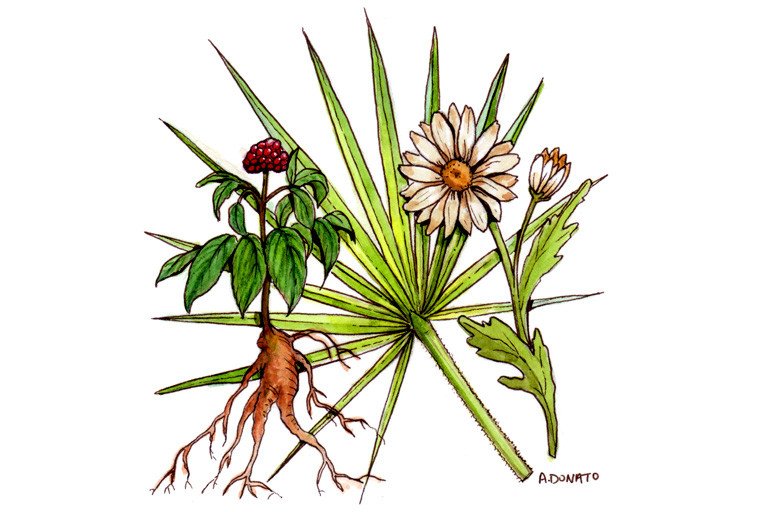
For Patients & Caregivers
Tell your healthcare providers about any dietary supplements you’re taking, such as herbs, vitamins, minerals, and natural or home remedies. This will help them manage your care and keep you safe.
Although PC-SPES has been studied in prostate cancer patients, the product was recalled due to product contamination.
PC-SPES is an herbal formula containing 8 herbs: reishi mushroom, baikal skullcap, rabdosia, dyer’s woad, chrysanthemum, saw palmetto, Panax ginseng, and licorice. Scientists do not know which substances in PC-SPES account for its activity. No single botanical or chemical extract appears responsible for the overall effects of this product. Laboratory tests have analyzed the makeup of PC-SPES and have identified estrogen-like compounds that suppress growth and proliferation of human tumor cell lines on contact, including breast, colon, and hormone-dependent and -independent prostate cancers. PC-SPES appears to interfere with the process of tumor cell division and also causes tumor cell death when cells are exposed to it long enough. The ability of PC-SPES to kill cancer cells may be due to alteration of specific genes involved in regulating cell cycle, structure, and response to androgens, such as testosterone. However, this effect has not been confirmed in humans.
PC-SPES used in clinical trials has been found to contain small amounts of prescription drugs including diethylstibestrol and ethinyl estradiol. It is unclear whether these agents account for its anticancer effects.
- To treat prostate cancer
Several preliminary studies showed that PC-SPES can lower PSA levels, but none found evidence of anticancer effects in men with prostate cancer.
- Breast pain
- Breast enlargement
- Sexual dysfunction and/or decreased libido
- GI symptoms, diarrhea, and dyspepsia
- Rare: Blood clots, including lung blood clots; vein inflammation, swelling, and allergic reactions
Case report
- Abdominal cavity bleeding: In a 62-year-old man with hormone-refractory prostate cancer and nodal metastases after one month of unsupervised use of this compound.
For Healthcare Professionals
PC-SPES is a supplement consisting of eight herbs: reishi mushroom, baikal skullcap, rabdosia, dyer’s woad, chrysanthemum, saw palmetto, Panax ginseng, and licorice.
Laboratory studies suggested it may have anticancer effects, particularly against prostate cancer. In vitro, it appeared to suppress both androgen-sensitive and -insensitive prostate cancers (7) (12). PC-SPES also demonstrated growth inhibition in a paclitaxel-resistant head and neck cancer cell line, although primary mucosal keratinocytes were less sensitive (18). It is thought that phytoestrogens (17) and other undefined components may contribute to its activity.
Preliminary human studies have documented efficacy of PC-SPES (10) (14) (15) (16), resulting in significant decreases in androgen and PSA levels. However, concerns about contamination with diethylstilbestrol, warfarin, and alprazolam resulted in a voluntary recall of PC-SPES by the manufacturer in 2002.
Based on the preclinical head and neck study, an evaluation of a similar formulation known as Prostaprotect, was also found to exert activity in paclitaxel-resistant cells (19). In contrast to PC-SPES, saw palmetto was replaced in this new formulation by an extract of pygeum, which is also used to alleviate prostatic hyperplasia symptoms. However, no clinical studies of this product have been conducted.
- Prostate cancer
Laboratory analyses of PC-SPES indicate the presence of estrogenic compounds different from diethylstilbestrol, estrone, and estradiol. In vitro testing of this extract shows suppressed cell proliferation and reduced clonogenicity in human tumor cell lines, including prostate, breast, and colon cancers. The predominant cell cycle effect induced by PC-SPES is prolongation of G1 phase. However, apoptosis was observed after exposure of tumor cells to PC-SPES for 48 hours or longer. PC-SPES also inhibits proliferation of LNCaP prostate cell lines, and was associated with a 60–70% downregulation of the proliferating cell nuclear antigen. Preliminary studies evaluating the viability of prostate cancer cell lines LNCaP, LNCaP apoptosis-resistant derivative, LNCaP-bcl-2, PC3, and DU145 at three concentrations of PC-SPES show inhibited growth at concentrations of 4 mcg/mL or less. Another in vitro study indicates its cytotoxicity may be due to alteration of specific gene expressions involved in regulating the cell cycle, cell structure, and androgen response. No single botanical or chemical extract appears responsible for the overall effects of this product. PC-SPES batches used in clinical studies have been found to contain small amounts of diethylstibestrol and ethinyl estradiol, but it is unclear whether these agents account for its anticancer effects.
(2) (3) (4) (5) (6) (7) (12) (13) (14) (16)
Common: Mastalgia, gynecomastia, sexual dysfunction, decreased libido, transient GI symptoms, diarrhea, and dyspepsia (8).
Infrequent: Pulmonary embolism, deep vein thrombosis, phlebitis, edema, and allergic reactions (10).
Case report
Retroperitoneal hemorrhage: In a 62-year-old man with hormone-refractory prostate cancer and nodal metastases after one month of unsupervised use of this compound (9).